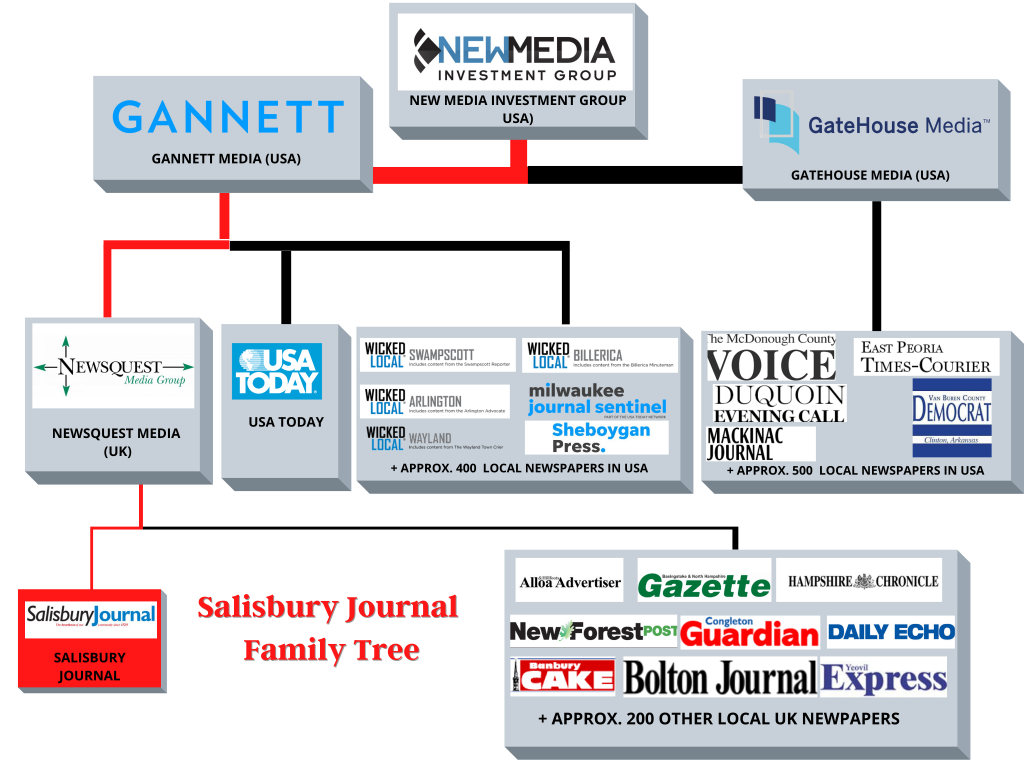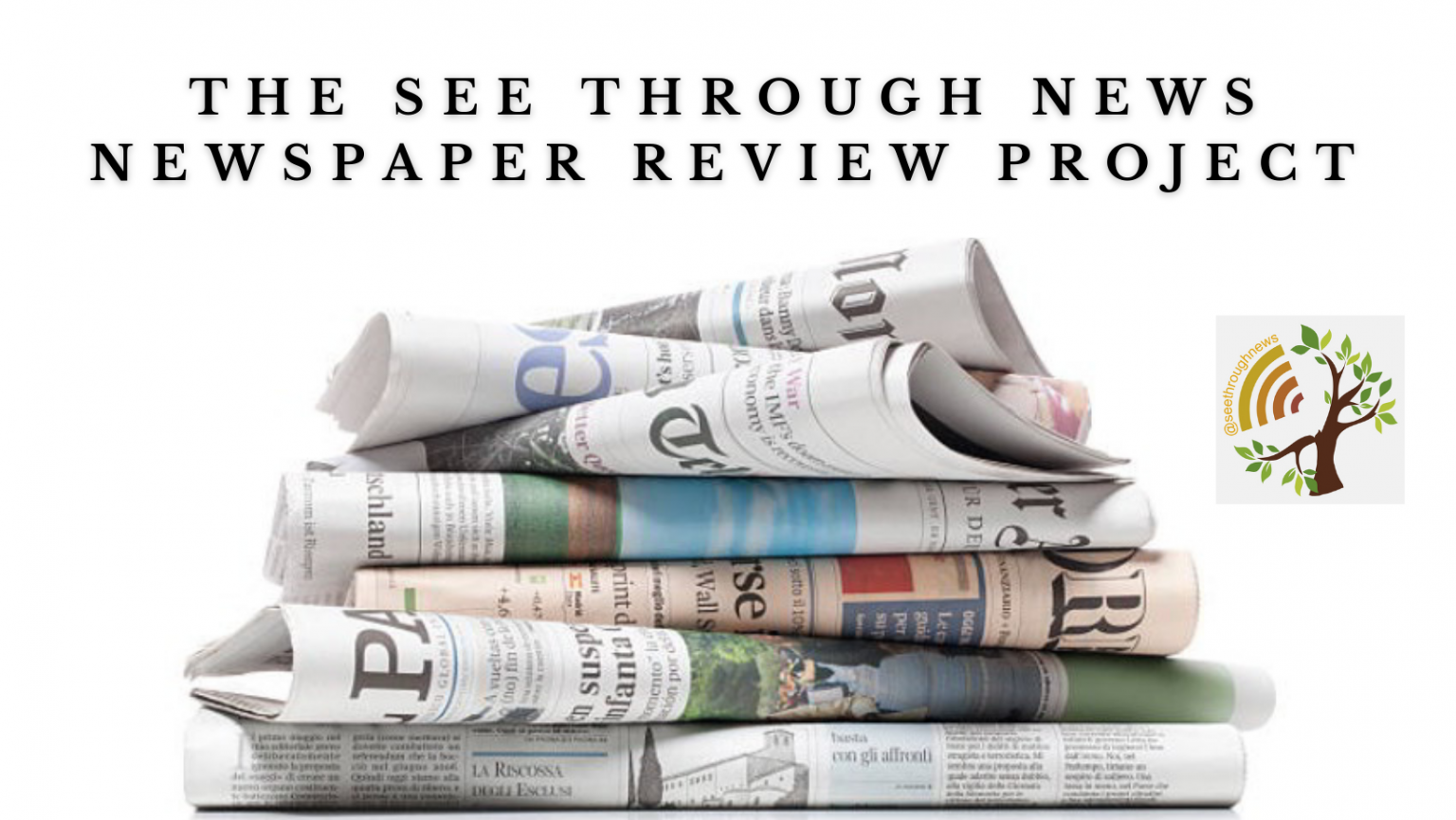A unique media literacy public service project for local journalism from See Through News
This Project aims to educate the public about the under-reported concentration of media power taking place in local newspapers. It’s part of the See Through News Goal of Speeding Up Carbon Drawdown by Helping the Inactive Become Active.
Along with Government and Business, Media plays a critical role in our Goal.
Distinguishing Real and Fake News is a critical issue, but this isn’t the main aim of the See Through News Newspaper Review Project.
This Project takes on a less obvious, but more insidious, challenge – distinguishing ethical journalism from unethical advertising.
If we think all journalism is the same, we get to choose our own facts. Climate action depends on a common acceptance of scientific fact, which is why we think this is such an important issue.
What’s Unique About the See Through News Newspaper Review Project?
Many media watchdogs and NGOS share our aims, but See Through News has a unique weapon – the Facebook Group URLs of hundreds of corporate-owned local newspaper titles around the world.
For those unfamiliar with the significance of this:
- Facebook Groups generate far more engagement – hence eyeballs, hence money – than Pages.
- Facebook is therefore gradually nudging its users towards Groups rather than Pages, making these bits of online real estate increasingly valuable.
- Local newspapers, and the media giants who now own the vast majority of them, somehow neglected to claim their FB Group URLS. Facebook operates a first-come, first-served policy, and this Project came first.
Facebook Group URLS are identical to Facebook Page URLs, with the addition of the sub-subdomain /groups/ in the URL you see in your browser window.
All local newspapers, even before they were hoovered up by corporate conglomerates, have claimed their Facebook Page URLs. They depend on them for the 20% of advertising revenue Facebook passes on to them. Searches look for the unique string of characters in their brand name.
But claiming a Page does not automatically secure the Group of the same name. This is a separate action. Like claiming a Page, Facebook allocates customised URLs on a first-come, first-served basis. If your brand is already taken, Facebook requires you to come up with a different unique character string (hence JohnDoe1983, therealJaneSmith etc.).
Claiming a Facebook Group URL is free, and takes around 30 seconds. For reasons only they can explain, almost no corporate-owned local newspaper has done it. They can no longer do it, because this Project has done it first.
This Project has more than 1,700 of these Group URLs.
To check:
- go to your local newspaper’s Facebook Page
- insert /groups/ after www.facebook.com and click Enter
- You should land on a Group called [your local paper] Review (if you don’t, either your local paper is still independently-owned or it’s slipped through our net – if it’s the latter please alert us and we’ll claim that one too).
- Click on ‘About’ or ‘People’ to check the identity of the Group Admin.
- If it’s not the corporate owner of the newspaper, it will be this Project.
The Project’s 1,700+ Groups cover the vast majority of corporate-owned local titles in the UK, USA, Canada, Australia, New Zealand, Ireland, Mexico and Japan.
In each of these countries, 75-90% of the surviving local newspaper titles are corporate-owned, often by only two ‘competitors’.
For example, take our pilot Review Group, the UK’s Salisbury Journal Review.
The Salisbury Journal was first published in 1729, and was independently owned for nearly three centuries.
When it was bought by Newsquest, it made the transition, repeated all over the world in various forms, from local newspaper to advertising platform, and became a tiny cog in a corporate clickbait machine.
If find this assertion unfair, overstated, or hyperbolical, consider that:
- Newsquest is the biggest of 5 media conglomerates that collectively own 90% of the UK’s local papers.
- Newsquest is owned by Gannett, until 2019 the USA’s biggest local news conglomerate.
- In 2019 Gannett merged with GateHouse, the USA’s biggest local news conglomerate.
- Gannett & GateHouse are now owned by New York hedge fund the New Media Investment Group.
Here’s the family tree of the once-venerable Salisbury Journal

Why Is This Project Important?
The Project uses its Review Groups to alert the public to this transition, provide them with tools to spot the tricks of the trade, and encourage them to distinguish ethical local journalism from unethical corporate advertising.
In fun, friendly, factful See Through News style, our Review Groups elucidate how once-cherished local titles are now zombie publications.
This Project is a public media campaign to draw attention to the under-reported fact that what were once local communities’ Trusted Voice of the People, are now advertising hoardings masquerading as journalism.
This concentration of media power is well-known in national print, TV and radio. Public awareness may have done nothing to prevent it, but at least most reasonably well-informed people are aware Rupert Murdoch owns The Times, The Wall Street Journal and Fox News, Jeff Bezos owns The Washington Post, or Disney owns ABC News. We can calibrate our responses accordingly.
This Project focuses on local newspapers not because its concentration of ownership is unique or any more insidious than what’s taking place at a national level, but because hardly anyone is aware it’s even happened.
Corporate owners conceal their logos at the bottom of their webpages, and in the smallest font on their inside pages for good reason – they don’t want their readers to know who now owns their local paper.
If your local paper doesn’t report who owns your local paper, who else is going to tell you?
This Project, that’s who.
What are the Project’s Aims?
- We aim to hold these zombie publications to account, performing the same role they did for generations before: independent critical friends holding Power to account, speaking Truth to Power, and serving the community as a trusted champion, asking awkward questions in the public interest, however embarrassing they may be to advertisers
- We flag and criticise unethical journalism, and explain why it falls short of the standards we’re entitled to expect from anything calling itself a newspaper. We point out such tricks as: generic, often algorithm-generated copy, fraudulent bylines and reporter profile pictures, re-printed press releases, and other advertorial content attempting to pass off as ethical journalism.
- We only name individual journalists when praising them, never when criticising them. The blame for slipping standards lies in the boardroom, not the newsroom. Most surviving journalists work under duress to pay the bills, and fight these deceptive practices daily, having seen colleagues who’ve done the same sacked or made redundant. Young journalists know no other system.
- We praise ethical reporting, and explain what makes it good local news journalism – rich, local colour, celebrating stories that feature local voices, and could not be published anywhere else. We value rich local flavour, content and insight, and we call out advertising-driven, corporate clickbait for what it is, even if it’s hidden behind fig-leaves provided by Old School journalistic mastheads.
By raising public awareness of bad journalism, we seek to encourage and promote good journalism.
The project welcomes discussion and promotion of alternative forms of community and citizen journalism, commercial or voluntary. There are many experiments that combine acceptable ethical standards with strong local character, and a sustainable business model.
This Project is integrated into the broader See Through News Social Media Network.
The Newspaper Review Group are particularly effective in combination with STN’s other local level Facebook Groups – see our pilot groups
See Through Salisbury (local news and debate)
Salisbury Notice Board (local events and notices)
I Love Salisbury (local photos, videos, dogwalks etc.).
For our parallel media literacy project addressing TV news, see The See Through News Vox Pox Project.
What Happens in the Review Groups?
Up to you. STN seeks only to set up the infrastructure, not to generate all the content, or even police it.
As Group Admins, we have ultimate veto power over what’s posted or not, and we set all the quality control setting to maximum in order to keep out trolls and clickbait.
The Group Descriptions make the scope of the group clear – anything that stays within their scope is fine.
If you’re looking for inspiration on what this might look like, The Salisbury Journal Review pilot group has plenty of material.
All conglomerates follow the same basic business model, so spotting similar unethical practices in your own corporate-owned paper should be relatively easy.
We’ve also created a couple of fun ways to kickstart these groups, our local journalism Sniff Test and Smell Test.
Here’s an overview of the concept behind them.
How Can You Help?
As an individual:
- Spread the word – share this article with others you think might find the Project interesting or important.
- Join your local Newspaper Review Group – if you live in the Anglosphere, Mexico or Japan, there’s a 90% chance your local paper is conglomerate owned. Search Facebook for the title of your local paper plus ‘Review’, filter for Groups, and you should find it. If not, and your local paper is corporate-owned, let us know and we’ll set the Review Group up for you.
- Share, Comment, Post in those Review Groups – this is how social media works! The more engagement, the wider the message spreads.
- Try the Sniff Test and Smell Test – see how your local paper measures up to our fun tests for ethical local journalism. Post and share your results to stimulate debate.
- Volunteer as Moderator/Admin for your local Review Group – this is not time-consuming, and you’d be very welcome to join our growing team of volunteers.
As an institution/NGO/watchdog:
- Spread the word – use your own networks to encourage your members to act on the above suggestions.
- Endorse the Project – nothing fancy, at this early stage, a sentence bearing your imprimatur that we could add to the Project would be a big help in raising its profile and building trust.
- Support the Project – See Through News is not looking for money, at this stage at least, but has a range of contingency plans in the event of legal action. We’d appreciate your advice, and are open to collaborating with any organisation sharing our goals. Corporate media is a formidable opponent, and there’s safety in numbers.
If you have any questions, please contact us at newspaperreview@seethroughnews.org

